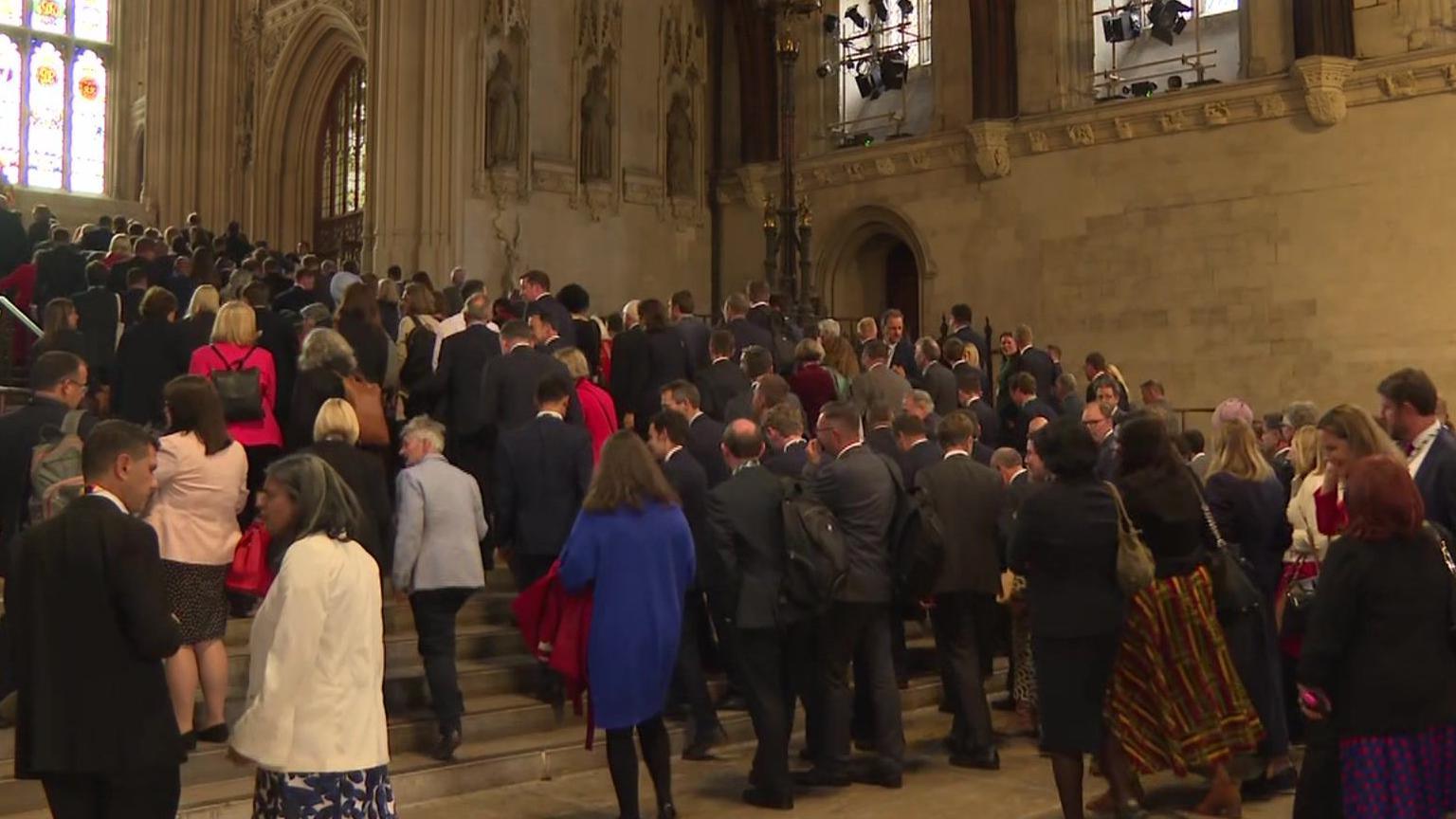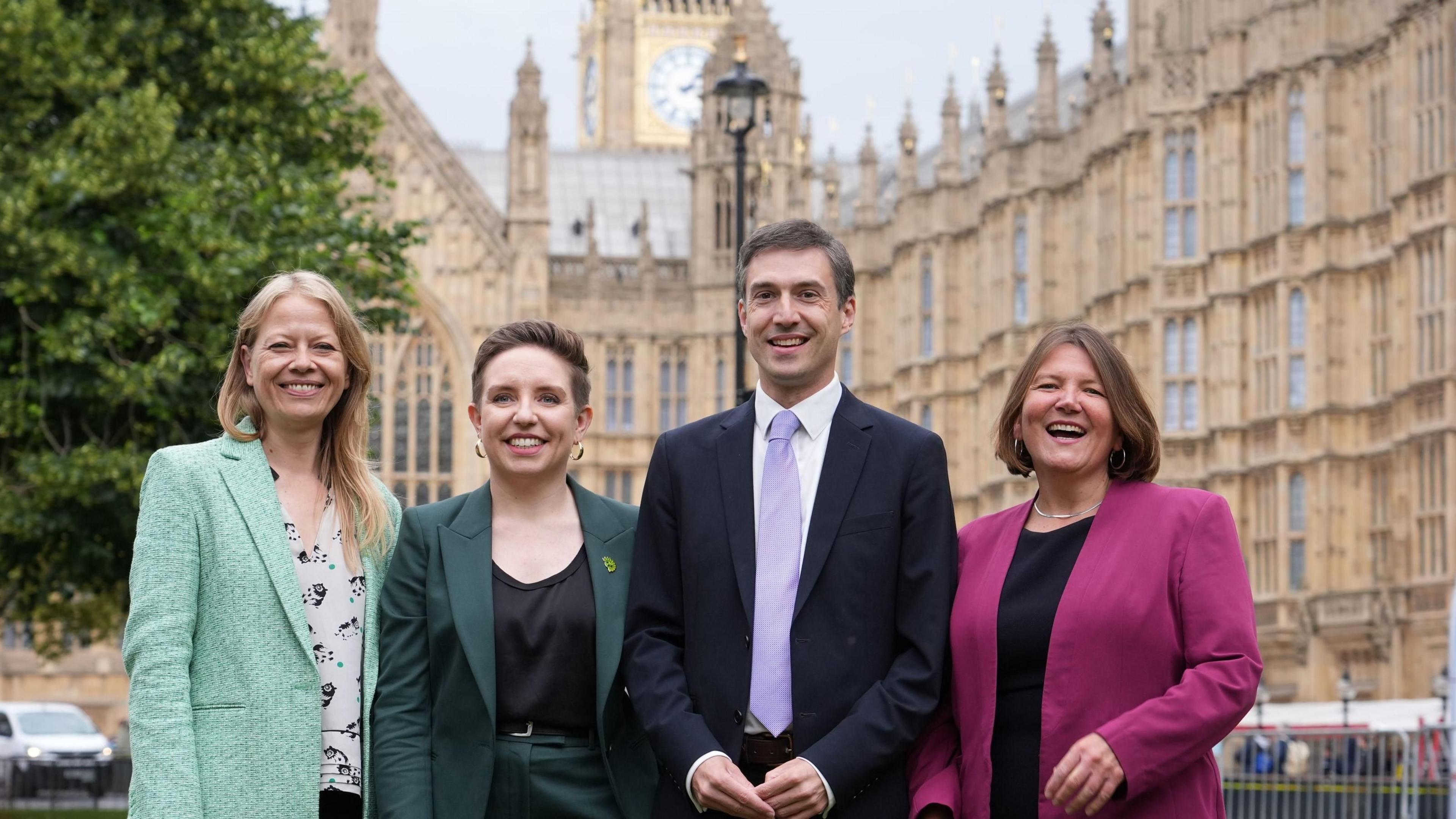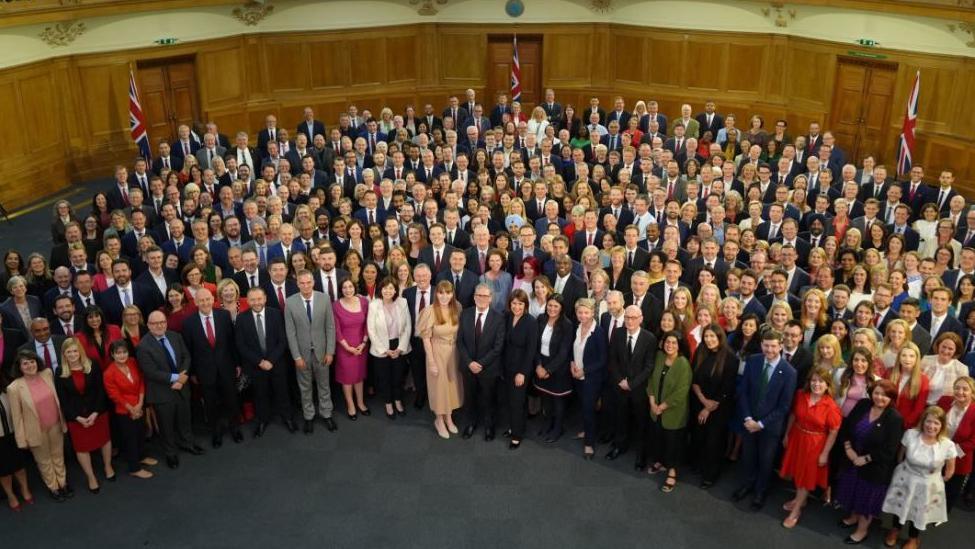'First day at school vibes' as new MPs start work
New Labour MP Adam Jogee on the need for sleep after election win
- Published
A corner of Parliament has been transformed into a welcome centre for newly-elected MPs with besuited officials greeting newcomers as they learn how to navigate life at Westminster.
More than half the new intake are completely new to the Commons and could be spotted struggling to find their way around on Monday as they begin life as an MP.
It is understandable some may get lost in the Houses of Parliament, a gothic fantasy palace which stretches over eight acres, with 100 staircases, more than 1,000 rooms and three miles of passages.
One of the new MPs, Conservative Ben Obese-Jecty, said a map was one of the key tools handed out to help navigate the "labyrinthine" Westminster corridors, alongside information about new laptops and how to hire staff.

"It's very much first day at school vibes," the Conservative MP for Huntingdon told the BBC.
"It's very much not knowing where you are, where your locker is, which room you need to be in - I imagine everybody is going to be late for everything for at least the first couple of weeks."
Each new MP is paired up with a member of the parliamentary staff in a 'buddy system' - partly to ensure they don't lose their way.
MPs received a white enveloped from the Returning Officer as soon as they were declared the winner at their individual constituency counts.
It contained a welcome letter from the clerk of the House of Commons and an information booklet about what to do when they first arrive.
There was also a letter from the Independent Parliamentary Standards Authority, external setting out information about pay, pensions, expenses and guides to staff payments.
Some of the keenest new MPs started arriving on Friday but many rested after long election nights, so this week is the first glimpse many MPs have had inside the halls and chambers - and the last day before the new Parliament begins on Tuesday.
Speaking as she boarded the train to London, Green Party co-leader and new MP for Bristol Central Carla Denyer said she was looking forward to seeing her three new colleagues at Westminster for the first time since the election and "giving them a massive hug".
The 2024 intake has been entering Parliament via Westminster Hall, the oldest part of the building, which was built in 1097 and was once the largest hall in Europe.
Just feet away from where Queen Elizabeth II lay in state, hordes of MPs with freshly-printed passes hanging around their necks were being greeted at a big stall welcoming them to Westminster.

The four new Green MPs made their way to Westminster on Monday
It was all hands on deck to show the newbies around, whether senior officials or members of catering staff - and one green-badged new MP was spotted accompanied by a white-jacketed sous chef.
Buddies first go to the new members' reception area in Portcullis House - a huge glass atrium filled with cafes and restaurants on the ground floor, and surrounded by offices and committee rooms on upper levels.
Next stop for most is the Commons, where there is only actually space for 430-odd MPs, to sit on the world-famous green benches, leaving about 220 trying to squeeze into various nooks and crannies elsewhere.
As excited newbies arrive, ousted veterans are clearing out their offices and heading off, with ex-cabinet minister, and now ex-MP, Therese Coffey spotted driving her car out of the main gates early this morning.
One of the new Labour MPs is Burton-on-Trent's Jacob Collier, who said he “definitely” has imposter syndrome, but added he’s "really looking forward to getting stuck-in".
Another is Adam Jogee, who's just been elected in Newcastle-under-Lyme and, despite having worked as a party staffer in the building before, said it was still "hugely daunting, massively exciting" to enter the building for the first time as an elected representative.
All the MPs are given security passes and offered a key for a locker, since it will be some time before they are given offices, but Mr Jogee said other hints and tips can be invaluable.
He said: "I've shown a couple of my pals where the loos are, a bit of advice on the best entrance to avoid the queues, and where the best soup is."
MPs are also being offered panic alarms when they arrive for their inductions in a symbol of how security concerns have grown in recent years.
The parliamentary security department has set up a mock front door to demonstrate security measures MPs can install at their homes and constituency offices. These include spy holes, alarms, video intercoms and CCTV cameras.
Mr Obese-Jecty said he found it "very reassuring" that security was being taken so seriously and he was feeling more confident about his family's safety.

What new MPs may find more of a shock is that their new locker could be their effective office for a month or maybe more, although improvements have been made since 2010, when 59% of new MPs waited five weeks or more for an office.
That's partly because of the backroom jockeying for the best offices, which are assigned by each party's accommodation whip and take into account seniority and length of service as an MP.
During the wait, MPs can hotdesk, with some committee rooms temporarily set aside for MPs to work and the Commons Library a popular quiet space.
Josh Babarinde, the new Liberal Democrat MP for Eastbourne, said he was there to "come and get stuff done" and had already been in touch with his local hospital demanding they re-open the midwifery unit.
With a desire to to "hit the ground running" a constant refrain from MPs of all parties they don't have long to wait before their first vote.
MPs and peers will troop into the House of Lords at 2.30pm on Tuesday to hear a Royal Commission formally give permission from the King to hold the new Parliament.
After that ceremony, MPs will elect a Speaker for the House of Commons, then start swearing in, with oaths of allegiance to the King.
If that isn't enough ceremony, the biggest parliamentary pageant is yet to come, with the State Opening of Parliament set to take place on Wednesday 17 July.
That's when the King reads out the Labour government's plans for new legislation they intend to pass over the next five years - and when the serious business of debating the merits of new laws begins.

Hundreds of Labour MPs pose for a first day of term photo